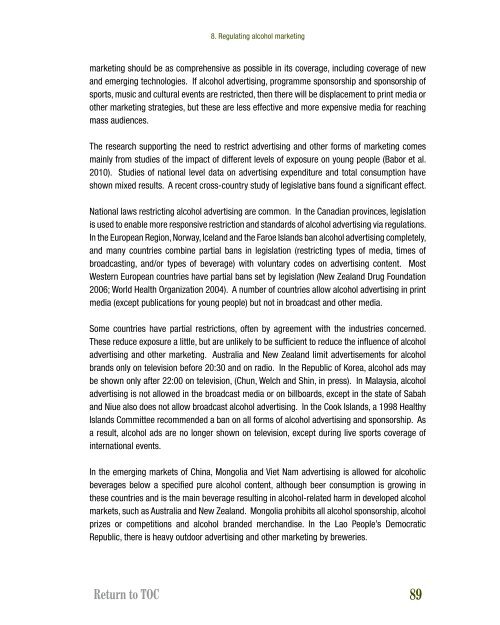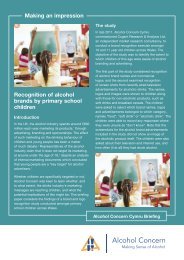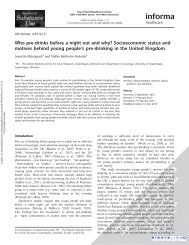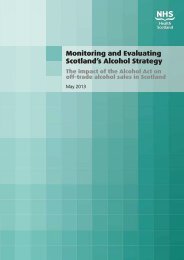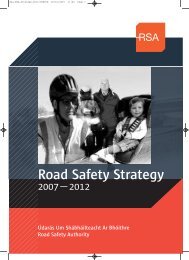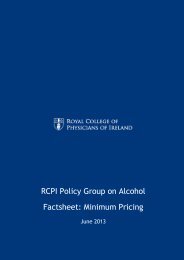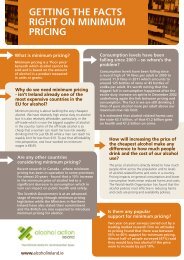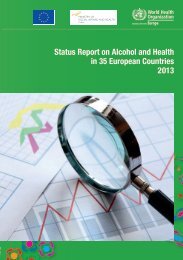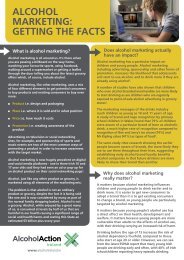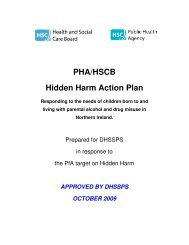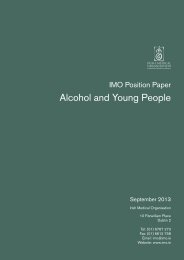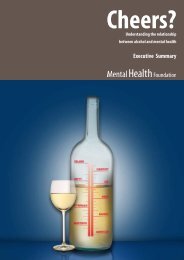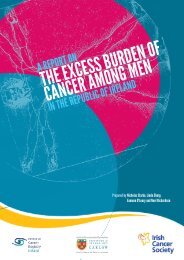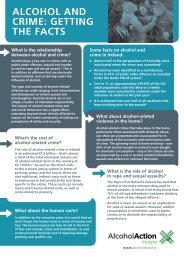Addressing the harmful use of alcohol - WHO Western Pacific Region
Addressing the harmful use of alcohol - WHO Western Pacific Region
Addressing the harmful use of alcohol - WHO Western Pacific Region
You also want an ePaper? Increase the reach of your titles
YUMPU automatically turns print PDFs into web optimized ePapers that Google loves.
8. Regulating <strong>alcohol</strong> marketing<br />
marketing should be as comprehensive as possible in its coverage, including coverage <strong>of</strong> new<br />
and emerging technologies. If <strong>alcohol</strong> advertising, programme sponsorship and sponsorship <strong>of</strong><br />
sports, music and cultural events are restricted, <strong>the</strong>n <strong>the</strong>re will be displacement to print media or<br />
o<strong>the</strong>r marketing strategies, but <strong>the</strong>se are less effective and more expensive media for reaching<br />
mass audiences.<br />
The research supporting <strong>the</strong> need to restrict advertising and o<strong>the</strong>r forms <strong>of</strong> marketing comes<br />
mainly from studies <strong>of</strong> <strong>the</strong> impact <strong>of</strong> different levels <strong>of</strong> exposure on young people (Babor et al.<br />
2010). Studies <strong>of</strong> national level data on advertising expenditure and total consumption have<br />
shown mixed results. A recent cross-country study <strong>of</strong> legislative bans found a significant effect.<br />
National laws restricting <strong>alcohol</strong> advertising are common. In <strong>the</strong> Canadian provinces, legislation<br />
is <strong>use</strong>d to enable more responsive restriction and standards <strong>of</strong> <strong>alcohol</strong> advertising via regulations.<br />
In <strong>the</strong> European <strong>Region</strong>, Norway, Iceland and <strong>the</strong> Faroe Islands ban <strong>alcohol</strong> advertising completely,<br />
and many countries combine partial bans in legislation (restricting types <strong>of</strong> media, times <strong>of</strong><br />
broadcasting, and/or types <strong>of</strong> beverage) with voluntary codes on advertising content. Most<br />
<strong>Western</strong> European countries have partial bans set by legislation (New Zealand Drug Foundation<br />
2006; World Health Organization 2004). A number <strong>of</strong> countries allow <strong>alcohol</strong> advertising in print<br />
media (except publications for young people) but not in broadcast and o<strong>the</strong>r media.<br />
Some countries have partial restrictions, <strong>of</strong>ten by agreement with <strong>the</strong> industries concerned.<br />
These reduce exposure a little, but are unlikely to be sufficient to reduce <strong>the</strong> influence <strong>of</strong> <strong>alcohol</strong><br />
advertising and o<strong>the</strong>r marketing. Australia and New Zealand limit advertisements for <strong>alcohol</strong><br />
brands only on television before 20:30 and on radio. In <strong>the</strong> Republic <strong>of</strong> Korea, <strong>alcohol</strong> ads may<br />
be shown only after 22:00 on television, (Chun, Welch and Shin, in press). In Malaysia, <strong>alcohol</strong><br />
advertising is not allowed in <strong>the</strong> broadcast media or on billboards, except in <strong>the</strong> state <strong>of</strong> Sabah<br />
and Niue also does not allow broadcast <strong>alcohol</strong> advertising. In <strong>the</strong> Cook Islands, a 1998 Healthy<br />
Islands Committee recommended a ban on all forms <strong>of</strong> <strong>alcohol</strong> advertising and sponsorship. As<br />
a result, <strong>alcohol</strong> ads are no longer shown on television, except during live sports coverage <strong>of</strong><br />
international events.<br />
In <strong>the</strong> emerging markets <strong>of</strong> China, Mongolia and Viet Nam advertising is allowed for <strong>alcohol</strong>ic<br />
beverages below a specified pure <strong>alcohol</strong> content, although beer consumption is growing in<br />
<strong>the</strong>se countries and is <strong>the</strong> main beverage resulting in <strong>alcohol</strong>-related harm in developed <strong>alcohol</strong><br />
markets, such as Australia and New Zealand. Mongolia prohibits all <strong>alcohol</strong> sponsorship, <strong>alcohol</strong><br />
prizes or competitions and <strong>alcohol</strong> branded merchandise. In <strong>the</strong> Lao People’s Democratic<br />
Republic, <strong>the</strong>re is heavy outdoor advertising and o<strong>the</strong>r marketing by breweries.<br />
Return to TOC<br />
89


